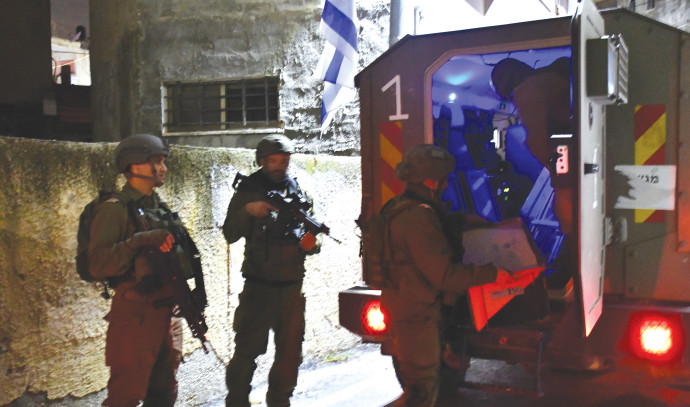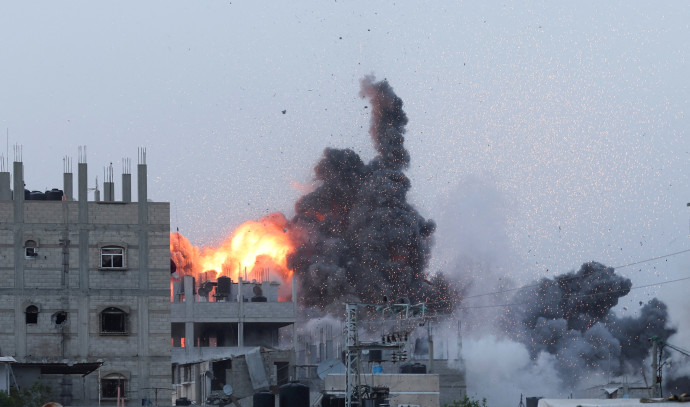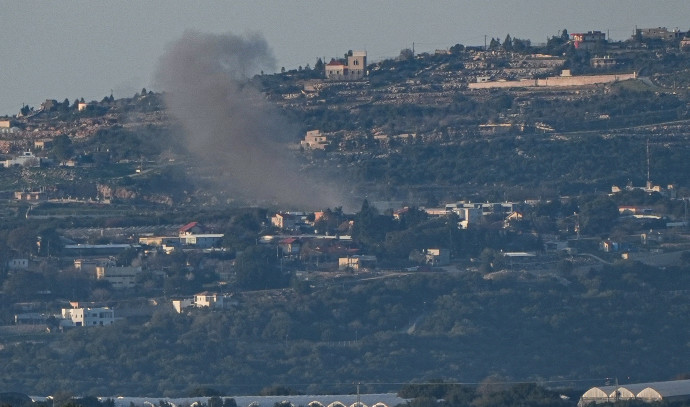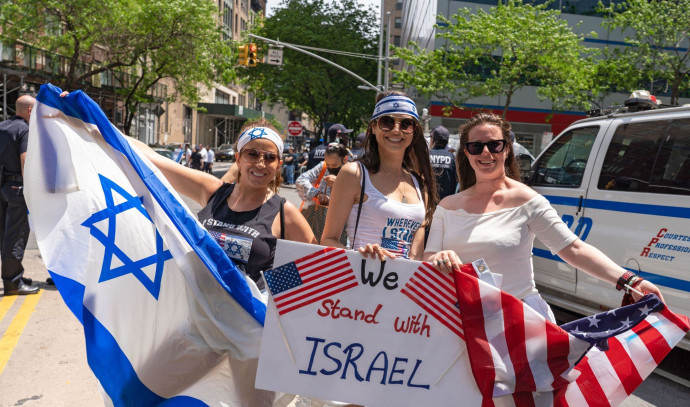world news
Operation Peace for Galilee: Israel’s 1982 military action in Lebanon
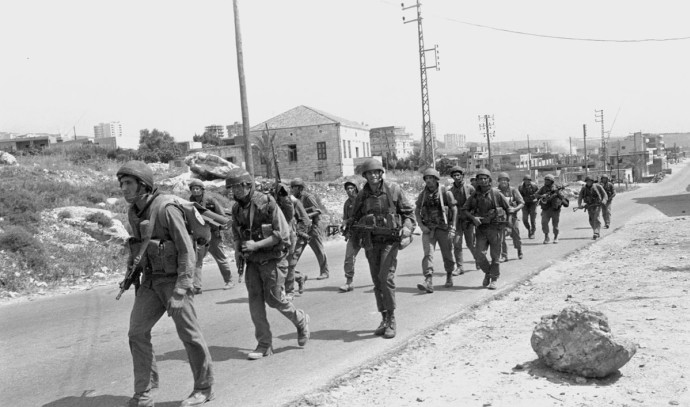
“Please give me a permit – I must go to Israel to see my son in the hospital.” The woman in the blue dress with the anxious eyes was not addressing me in the crowded public square at Tyre.
She was plucking at the sleeve of the IDF spokesman who was explaining to me the local situation – they’d had water for two weeks, and the electricity was also now turned on… facts and figures that seemed unimportant against the urgency of the woman’s pleas. Wearily, he told her it was not his function and pointed out where to wait – where he had already directed scores of others anxious to move to Israel or to rejoin relatives up north in Beirut. Most of them stood patiently next to a truck piled with blankets that would later be distributed to those who needed them.
Later, I went over to her. “Can you help me get a permit?” she asked, clutching at straws. Amira would have been an attractive woman under different circumstances. She was about forty, well dressed, a gold cross around her neck. But the worry lines around her eyes and mouth were already etched deeply. Like many from southern Lebanon, now that the PLO had been routed, she had returned to her home in Tyre from Beirut, where she had fled with her son. But he’d been caught in the crossfire a week before and taken by helicopter to a hospital in Nahariya. “It is good to come home” she told me. “My house is fine; not even a broken window, and wonderful to know that I am safe from ‘them.’ But I can’t start my life again properly until my son is better and can live with me. I want to visit him.”Remembering Tyre amid Israel’s operations in Lebanon in 1982
Tyre is a picturesque town. We drove there from Naqoura, where the UNIFIL forces have their headquarters – it’s a Western-style shanty town, like something from an old cowboy movie. It has a Silver Coast restaurant, clothing store, a barber shop and “coiffure de dames” for the Swedish nurses at SWEDMEDCO opposite. But Tyre, 20 km. from the border, is different. The shopping center was doing a brisk trade on this Sunday morning, particularly Patisserie Arabe – a giant cake shop with the kind of mouth-watering confections that I’d only seen in Groppi’s coffee house in Cairo. A 10-tier wedding cake dominated the window.
The proprietor, Mr. Ramlawi, was doing business as usual, despite the war – business better than usual, one of my companions remarked cynically. Whether he was happy that Israel had cleared the PLO out of Tyre or was benefiting from the influx of soldiers and journalists in town, Mr. Ramlawi did seem very cheerful indeed. He even had the word “Open” lettered in Hebrew on his door (in fact, there were many shops with Hebrew signs, some even offering discounts for soldiers). “You are welcome in this country” he informed me, noticing my IDF liaison officer waiting nearby. “When the terrorists were here, they would come in my shop, ten at a time, taking whatever they wanted. Food, money, drinks. It is good that you got them out.”
It is thought that there are still many PLO terrorists in Tyre, but the townspeople regularly inform on them, either to the IDF or to their local bishop. About 90 had been turned in the week before.
Tyre has a romantic location, situated around a tiny bay with a marina. Several fishermen were wading in the water, patiently waiting for a bite. The skyline of minarets, spires, and domes reminded me of Acre.
Just outside Tyre, we visited the archaeological site of a Roman stadium from 13 BCE. The third-largest in the world, it is well preserved. The enormous hippodrome was used for chariot races and gladiatorial combat. Behind the rows of seats were cleverly concealed rooms built by the PLO. It was from this site that rockets were launched at Nahariya. Israel knew this, but did not bomb it in order to preserve the magnificent ruins. We’d looked in the dark bunkers, now filled with the ugly remnants of war – spent shells, tin helmets, terrorist literature. There was a rancid stench of decay.
When we came out again into sunshine, there was an elderly man with a cane and a smart straw hat, who seemed eager to show us around. He spoke a strange kind of English, very old-fashioned. He was neither friendly nor unfriendly. He said his name was Zyklowi. He motioned us to follow him, and I had to trot to keep up with him. All the time, he was giving a kind of monologue about the amphitheater. “See these flat stones – they were altars. Human sacrifice,” he stated.
I would nod and try to interrupt with questions of my own – but about today, not the past. These he would ignore, pretending not to understand. “Here you see three layers of civilization – under this Roman Road, you can see the Greek … and this is Byzantine.”
“I just wanted to ask you –”
“Here is an aqueduct,” he would interrupt me. “It carried water out five miles.”
“The bunkers, Mr. Zyklowi, did you know about them?”
“I am guide,” he said after a pause. “I work here.”
He would say nothing more. He waited expectantly. We gave him a tip.
It was like a holiday scene when we crossed the Litani River. The banana plantations looked splendid in the hot sun. Soldiers in bathing suits did their laundry in the river, with towels and underwear strung up to dry. Every building seemed to be flying a flag. Over some, fluttered the Lebanese flag – two red stripes, and a white central stripe with a stylized cedar tree in the center. A few houses had the Phalange flag, but most – to be safe – flew a large white flag of surrender. I thought that if I’d been living through an eight-year war, I’d fly a white flag too.
On the road to Sidon, the scenery continued to be beautiful… sparkling sea striped in bands from light aqua to deep indigo; and the green of figs, grapevines, and lemon orchards. When we reached Sidon, there was a demonstration by women – they were screaming, and some were crying. I was told they were the partners of male Palestinian prisoners. A soldier fired twice in the air, shockingly close to us, and they dispersed. Sidon reminded me of Haifa.
There was bomb damage, but not a lot. I had expected it to be worse. What had once been an elegant villa had the roof damaged – it sat at a drunken angle, ludicrous atop the white façade and fluted columns in front. Through the open door, I glimpsed high ceilings, crystal chandeliers, velvet drapes, and a parquet floor. A young man came out. “You can’t go up,” he told our photographer, who had asked permission to shoot scenes from the top floor. “It’s locked. I don’t have a key,” the man repeated several times. I asked him if he was glad that Israel had come to his country. His facial expression became guarded. “You do good job” he finally acknowledged. “PLO bad people – get them out. Then you must go too. PLO, Syrians, Israelis – you must all go home.”
In the center of town, a woman was directing a group of children sweeping the street in front of a slightly damaged building. She was blonde and looked American. I went to talk to her, but she shook her head – she only spoke Arabic. Suddenly I was surrounded by children, all wanting to be photographed with me. They laughed and chattered like happy kids anywhere.
Just before Beirut where we were turned back, the sounds of battle were frighteningly loud, and 155mm. cannons were firing over our heads. We headed for the mountains. En route, we stopped for refreshments at a diner on the beach front with the unlikely name Sands Rock Beach. Hard to believe that the war was just a few kilometers away. People sat on the terrace eating grilled chicken and chips; sipping cans of 7-UP. Pretty girls in bikinis showed off their suntans, and the beach was crowded with Sunday pleasure-seekers.
We tried to find a word to describe the Lebanese people who were swimming, eating, and enjoying themselves, seemingly indifferent to battle sounds from Beirut. We began with “placid,” moved on to “calloused,” “impervious,” “resigned,” and “uncommitted.” None of them seemed to convey the right shade of meaning. Maybe “fatalistic”?
One of our last stops was at Jazzinem, a beautiful village high in the mountains. Unbelievable, considering where we were… a peaceful Sunday afternoon promenade. No signs of the war at all – no bomb damage, nothing to convey that you weren’t holidaying in the Swiss Alps. Girls walked in pairs, fingers linked, in high-heeled sandals. jewelry, and makeup. One pretty girl wore a T-shirt that proclaimed in silver and pink: “Sweet things remind me of you.” What brought us back to reality was when the four of us – my three male companions and I – went into a coffee house, where men were playing backgammon and cards. The sudden cessation of activity and uncomfortable glances as we sat down at a table made us realize our faux pas. A man at the next table, smoking a nargila water pipe, talked to my companions, ignoring me. It seemed the coffee house was for men. The women were home with the children or talking to their friends. The waiter served us with averted face.
Darkness was falling when we were on the road to Nabatiye – a terrible road fit only for donkeys. The sun sat low in the sky, an orange disc with drifts of blue cloud floating across it. The light became pink, blue, and finally black. We drove quickly, trying to reach the border before the curfew. We didn’t make it and were stopped angrily at checkpoints, where soldiers of different allegiances shouted at us.
Eventually we crossed the Israeli border and began the long drive back to Jerusalem through the silent night, where the only sounds I heard were the voices from Lebanon, repeating their words in my ears like the rerun of an old movie. ■
The writer is the author of 14 books. She can be contacted at: dwaysman@gmail.com
world news
Biden delays deporting Lebanese citizens from US over Hezbollah-Israel conflict

The United States is deferring the removal of certain Lebanese citizens from the country, President Joe Biden said on Friday, citing humanitarian conditions in southern Lebanon amid tensions between Israel and Hezbollah.
The deferred designation, which lasts 18 months, allows Lebanese citizens to remain in the country with the right to work, according to a memorandum Biden sent to the Department of Homeland Security.
“Humanitarian conditions in southern Lebanon have significantly deteriorated due to tensions between Hezbollah and Israel,” Biden said in the memo.
“While I remain focused on de-escalating the situation and improving humanitarian conditions, many civilians remain in danger; therefore, I am directing the deferral of removal of certain Lebanese nationals who are present in the United States.”Increased attacks since Oct.7
Israel and Hezbollah have been trading fire since Hezbollah announced a “support front” with Palestinians shortly after its ally Hamas attacked southern Israeli border communities on Oct. 7, triggering Israel’s military assault in Gaza.
The fighting in Lebanon has killed more than 100 civilians and more than 300 Hezbollah fighters, according to a Reuters tally, and led to levels of destruction in Lebanese border towns and villages not seen since the 2006 Israel-Lebanon war.
On the Israeli side, 10 Israeli civilians, a foreign agricultural worker and 20 Israeli soldiers have been killed. Tens of thousands have been evacuated from both sides of the border.
Hezbollah is an Iran-backed terrorist group and the most powerful military and political force in Lebanon.
world news
Preparing for war: Haifa mayor describes city’s infrastructure changes tensions in North escalate

Haifa mayor Yona Yahav spoke this past Monday with Lior Rosenfeld on Radio North 104.5FM about the escalation of the war in the North and his entry into political office amidst the security situation.
Yahav began, “I cannot speak on behalf of the North as I don’t know exactly what’s happening there. No one updates me, as if we are not the largest and most important city in the North. Tomorrow, the Home Front Command is coming to see us for the first time, and we will see what they have to say. We are doing everything to ensure that the city itself and our residents are safe and know what to do in case, God forbid, missiles fall on us. They are more accurate than those in 2006.”
Yahav also discussed the city’s preparations for a war in the North.
“We are now changing the entire method of building public structures,” Yahav said. “We are preparing them for prolonged stays. The minimum will be four consecutive days in shelters and such buildings, which require preparation. For example, installing toilets, which we don’t have today, and we have given instructions to build them in places close to where new houses are being built. This has been fully understood, and developers have begun to understand that the talk about evacuation and reconstruction has undergone drastic changes in light of the security situation. For example, road width needs to be maintained for the sake of evacuating residents on these roads. These are things that were not considered until now and must now be taken into account.”
Yahav’s plans for the success of Haifa’s future
Yahav then discussed his appeal to the transportation minister to stop the Highway 23 Carmel Tunnels’ toll charge.
“We called on the transportation minister to stop the discrimination. Haifa and the North are always discriminated against compared to central Israel, and there’s no reason for this. There are huge tunnels dug in Jerusalem that do not cost residents any money to pass through. There’s no reason why the tunnels dug in Haifa should include a toll. I speak on behalf of Haifa residents, and we are preparing to petition if we do not receive an answer.”
Regarding his entry into his mayoral role about three months ago, Yahav said, “I found a completely ruined city. They destroyed the municipality, and it’s very difficult to move things around. I don’t understand how residents sat idly by and kept quiet. We are trying to go to government offices to fix relations, to get funds, to move projects to bring in fees – and we are doing all this in a short time.
“The ministers are acting openly and with the goodwill to help. I am now waiting for the money on the table. The casino building in Bat Galim will be a luxurious hotel on the Bat Galim seashore. This neighborhood will undergo a complete transformation and will be the most beautiful neighborhood in the country. It will also be the only neighborhood facing a recognized beach. We came to make a change, and we will succeed.”
In conclusion, he touched on the issue of wild boars: “You won’t be able to follow them because soon you won’t see them anymore.”
world news
‘Psychological operation’: Turkey condemns FM Katz social media post depicting toddler Erdogan

Turkey’s Foreign Affairs Ministry released a statement on Sunday condemning a social media post made by Foreign Minister Israel Katz, in which Katz presented Turkish President Tayyip Erdogan as a toddler on the lap of Iran’s Ayatollah Ali Khamenei.
Katz, in a Sunday post on X, wrote “Erdogan @RTErdogan finances and arms terrorist organizations of Hamas to carry out attacks and murder against Israelis. The General Security Service captured a squad of students from Bir Zeit who were employed by the Hamas headquarters in Turkey to carry out murder attacks in Israel, through training and weapons and tens of thousands of dollars provided to them.
“Erdogan turned Turkey into a state that supports terrorism and subjects Turkey to the Iranian axis of evil in the name of extreme ideology and blatant anti-Semitism.”
Katz’s comments were made in reference to a recently thwarted terror attack planned by the student Hamas cell in Bir Zeit University, north of Ramallah. The attempted attack, the Shin Bet (Israel Security Agency) said, was directed by Hamas’s base in Turkey.ארדואן @RTErdogan מממן ומחמש ארגוני טרור של החמאס לביצוע פיגועים ורצח נגד ישראלים. שירות הביטחון הכללי לכד חוליית סטודנטים מביר זית שהופעלו ע”י מפקדת החמאס בטורקיה לביצוע פיגועי רצח בישראל, באמצעות אימונים ונשק ועשרות אלפי דולרים שסופקו להם.ארדואן הפך את טורקיה למדינה תומכת טרור… pic.twitter.com/R0SCjYdngN
— ישראל כ”ץ Israel Katz (@Israel_katz) July 21, 2024
Turkey condemns the social media post
The Turkish ministry responded “The Israeli Foreign Minister is trying to hide Israel’s crimes against the Palestinians behind a series of lies, slander and disrespect.
“Israel’s dirty propaganda targeting Türkiye and President Erdoğan, and psychological operation attempts will not bear fruit.
“The members of the Netanyahu Government, who have killed nearly forty thousand Palestinians in Gaza and are now trying to start a regional war in order to stay in power, will be tried in international courts and held accountable for their crimes.
“Türkiye will continue to speak the truth and defend the right of the Palestinian people to live in justice and peace.”
The ministry cited data provided by the Hamas-run Gaza health ministry, which does not distinguish between combatants and civilians.
Additionally, Turkey has repeatedly asserted that it does not categorize Hamas as a terrorist organization – despite its western allies acknowledging it as such and its proven attacks on Israeli civilians.
-

 Solar Energy3 years ago
Solar Energy3 years agoDLR testing the use of molten salt in a solar power plant in Portugal
-

 Camera3 years ago
Camera3 years agoCharles ‘Chuck’ Geschke, co-founder of Adobe and inventor of the PDF, dies at 81
-
world news8 months ago
Gulf, France aid Gaza, Russia evacuates citizens
-
world news3 months ago
Jewish diaspora expresses concern as Iranian drones launch toward Israel
-

 Camera3 years ago
Camera3 years ago80,000MP panoramas: EarthCam announces world’s highest-resolution robotic webcam
-

 TOP SCEINCE3 months ago
TOP SCEINCE3 months agoCan animals count?
-

 Solar Energy8 months ago
Solar Energy8 months agoGlencore eyes options on battery recycling project
-

 Camera8 months ago
Camera8 months agoDJI Air 3 vs. Mini 4 Pro: which compact drone is best?




